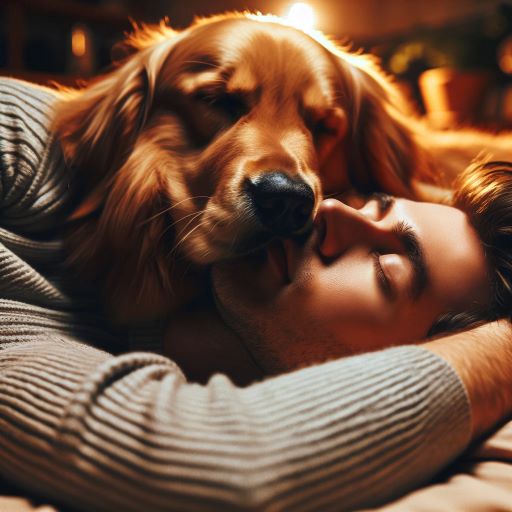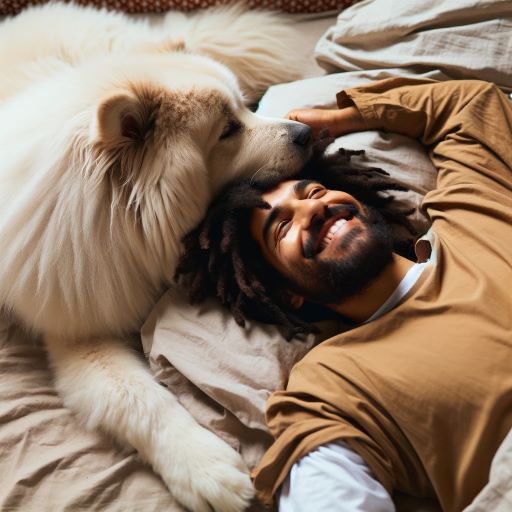Why Does My Dog Sleep on My Head? Top 20 reasons

Every night, as I settle into bed, a familiar routine unfolds. No sooner have I turned off the light, my faithful companion, Charlie, a sprightly Jack Russell Terrier, makes his way from the foot of the bed to his preferred sleeping spot: right on top of my head. This quirky behavior led me to ponder, “Why does my dog sleep on my head?” Initially, I thought it was just a random preference or perhaps a way for him to stay close. However, as the nights turned into weeks, and the weeks into a constant habit, my curiosity grew. What was driving Charlie to choose such an unusual spot to rest? Was it affection, comfort, or something instinctual? This peculiar sleeping arrangement, while endearing, sparked a quest for understanding, delving into the fascinating world of canine behavior to uncover the reasons behind this intimate and somewhat comical choice of sleeping quarters.
The behavior of dogs sleeping on their owners’ heads can be puzzling and endearing. This article explores the reasons behind this behavior, sheds light on why dogs might sleep with their heads propped up, and offers practical advice for those looking to gently discourage this habit.
Understanding the Behavior
Why Does My Dog Sleep on My Head?
Dogs are known for their loyalty and affection towards their owners, often displaying their love in unique ways. One of the more peculiar habits is the tendency of some dogs to sleep on or near their owner’s head. While this behavior might seem odd, there are a variety of reasons why dogs choose to do this, ranging from seeking comfort and security to showing love and affection.

1. Seeking Warmth and Comfort
When considering “why does my dog sleep on my head,” warmth and comfort are often the primary motivators. The human head, peering out from under the covers, radiates warmth, creating an appealing spot for dogs seeking cozy warmth. This behavior is not merely about physical comfort but also the psychological comfort found in the proximity to their owner. The combination of warmth, familiar scents, and the soothing sounds of breathing makes this spot irresistible for many dogs, emphasizing their need for both physical warmth and emotional security.
2. Instinctual Behavior
The instinctual behavior of dogs sleeping on your head traces back to their ancestral habits, where sleeping in piles for warmth and protection was common. This pack mentality, deeply ingrained in their instincts, drives them to seek closeness and security with their pack members—in this case, their human family. Understanding this behavior as a natural instinct rather than a learned habit underscores the deep-rooted need for safety and warmth that dogs seek in the company of their owners.
3. Bonding and Affection
The act of sleeping close to you, particularly on your head, is a potent symbol of your dog’s affection and bonding. It signifies their desire for closeness and demonstrates a deep emotional connection. This behavior is your dog’s way of expressing love, seeking comfort, and ensuring they are as close to their favorite person as possible, which strengthens the bond between you and your dog, highlighting the importance of physical closeness in building and maintaining this emotional bond.
4. Seeking Security
For many dogs, especially smaller breeds or those with anxiety, sleeping on your head is about seeking a secure place. This position allows them to feel protected by their most trusted companion, providing a sense of safety and comfort that is especially important for dogs with anxiety issues. It reflects their trust in you to provide protection and the comfort they feel in your presence, which is crucial for their well-being.
5. Scent Marking
Dogs have scent glands in their cheeks and face, and by sleeping on your head, they can mark you with their scent. This scent marking is a way of claiming you as part of their pack and establishing a strong bond. It’s a subtle yet powerful way for dogs to communicate their affection and ensure their scent is mingled with yours, reinforcing the emotional connection and the sense of belonging they feel with you.
6. Protective Instinct
The protective instinct is another reason why dogs may sleep on your head. This position allows them to be alert to any potential dangers, ensuring they can protect you if needed. It’s a testament to their natural protective instincts and their role as guardians, highlighting their commitment to keeping their loved ones safe, even during sleep.
7. Comfort in Routine
Dogs are creatures of habit, and once they begin sleeping on your head and are allowed to continue, it becomes part of their routine. This behavior, once established, becomes a preferred sleeping position due to the associated comfort, warmth, and security it provides. It underscores the importance of routine in a dog’s life and how quickly a behavior can become ingrained as part of their daily habits.
8. Health Issues
Sometimes, dogs may seek the warmth of your head due to underlying health issues, like arthritis, where the warmth provides relief from discomfort. This behavior indicates their need for physical comfort and relief, showcasing the intuitive ways dogs seek to alleviate pain and discomfort, emphasizing the importance of being attuned to changes in your dog’s behavior that may signal health issues.
9. Separation Anxiety
Dogs with separation anxiety might sleep on your head to stay as close as possible, driven by the fear of being separated from you. This proximity helps alleviate their anxiety, providing a sense of security and reassurance. It highlights the impact of emotional distress on a dog’s behavior and the lengths they will go to feel secure and connected to their owners.
10. Seeking Attention
Sleeping on your head can also be a way for dogs to ensure they receive attention, leveraging the close physical proximity to encourage interactions like petting or cuddling. This behavior demonstrates their desire for affection and interaction, showcasing the social nature of dogs and their need for regular engagement with their owners.
11. Enjoyment of Your Scent
The powerful sense of smell dogs possess means they may find the scent of your hair and scalp particularly comforting and calming. This attraction to your scent is another reason why they may choose to sleep on your head, seeking the comfort and reassurance that your unique smell provides them, underscoring the importance of scent in how dogs perceive and interact with their world.
12. Warmth of Breath
The warmth and rhythm of your breath can be incredibly soothing for dogs, with sleeping on your head placing them in the perfect spot to enjoy these sensations. This behavior reflects their desire for comfort and reassurance, reminiscent of the warmth and safety they felt as puppies with their littermates and mother, highlighting the soothing effect of close physical contact.
13. Preference for Softness
The preference for softness is another reason why dogs may choose to sleep on your head, as your pillow is likely one of the softest spots in the bed. This behavior is about seeking the ultimate comfort while resting, similar to how humans have their own preferences for soft, comfortable sleeping surfaces, reflecting the basic need for comfort in rest.
14. Feeling of Inclusion
Sleeping close to you, especially near your head, allows dogs to feel included and part of the pack. This sense of inclusion is essential for their social nature, reinforcing their place within the family and strengthening the bond between you and your pet, highlighting the importance of social bonds in a dog’s life.
15. Elevated View
An elevated view, achieved by sleeping on your head, allows some dogs to monitor their surroundings more effectively. This strategic positioning can make them feel more in control and better able to protect their territory and loved ones, illustrating the natural vigilance and protective nature of dogs even while at rest.
16. Territorial Behavior
Territorial behavior may also manifest as dogs sleeping on your head, displaying dominance or claiming their most valued resource—you. This behavior can stem from a place of affection but also highlights the complex social dynamics at play within the home, emphasizing the need to understand and manage canine behavior effectively to maintain harmony.
17. Mimicking Behavior
Dogs often mimic the behavior of their owners, and sleeping on your head might be their way of copying your behavior of laying your head on pillows or cushions. This mimicry is a form of social learning and bonding, demonstrating the deep influence owners have on their dogs’ behavior and how dogs seek to integrate themselves into the family unit by adopting similar behaviors.
18. Enjoying the Quiet
The relative quiet and disturbance-free zone at the top of your head make it an appealing spot for dogs seeking a peaceful resting place. This preference for a quiet sleeping spot away from potential disturbances like moving feet or hands highlights dogs’ sensitivity to their sleeping environment and their need for uninterrupted rest.
19. Heartbeat and Breathing
The sound of your heartbeat and steady breathing is incredibly soothing to dogs, reminiscent of their time as puppies sleeping with their littermates and mother. This behavior underscores the comforting effect of close physical contact and the innate need for social connection and reassurance found in the familiar sounds of their owners.

20. Unique Personality Quirk
Finally, sometimes the reason your dog sleeps on your head is as simple as a unique quirk in their personality. Just as humans have their own sleep preferences, so do dogs. This individual variation in behavior highlights the unique personalities of dogs and the diverse ways in which they express their affection, comfort preferences, and social bonds with their owners.
Read Also: How to Train Stubborn Dog With These Simple Steps
Addressing the Behavior: 10 Ways to Stop It
- Provide a Comfortable Bed: Ensure your dog has a cozy bed of their own, ideally in the same room as you, to encourage them to sleep there instead.
- Establish a Routine: Consistency in bedtime routines can help your dog feel secure and understand where they should sleep.
- Use Positive Reinforcement: Reward your dog for sleeping in their bed with treats and praise.
- Limit Access to the Bed: Gradually discourage the behavior by limiting their access to your bed at night.
- Create Physical Barriers: Consider a pet-friendly bed divider or pillow barrier to gently discourage your dog from sleeping on your head.
- Exercise and Stimulation: Ensure your dog gets plenty of exercises during the day so they’re more likely to sleep soundly in their own bed.
- Address Anxiety: For dogs with anxiety, consult a veterinarian or animal behaviorist for strategies to help them feel more secure.
- Keep the Bedroom Cool: A cooler bedroom might discourage your dog from seeking the extra warmth of your head.
- Use Command Training: Train your dog with a command that signifies it’s time to go to their bed.
- Be Patient and Consistent: Changing this behavior can take time, so it’s important to be patient and consistent in your approach.
Why Does My Dog Sleep with Head Propped Up?
- Breathing Comfort: Some dogs may sleep with their head propped up to facilitate easier breathing, especially if they have respiratory issues or brachycephalic syndrome, common in flat-faced breeds. Elevating their head helps keep their airways open, allowing for more comfortable breathing during sleep. This position can also be beneficial for dogs with heart conditions or other health issues that might affect their breathing when lying flat.
- Alertness: Dogs that sleep with their head propped up are often doing so to maintain a level of alertness, even while resting. This position allows them to quickly respond to environmental sounds or movements, keeping them ready to protect or react to potential threats. It’s a natural behavior that ensures they can be both comfortable and vigilant, demonstrating their innate protective instincts towards their family and territory.
- Comfort Preference: Just as humans have preferred sleep positions, dogs also have their own comfort preferences. Sleeping with their head propped up might simply be more comfortable for them, whether it’s due to physical reasons like supporting their neck muscles or psychological reasons like feeling more secure. Observing your dog’s sleeping habits can provide insights into their comfort preferences and help you create a sleeping environment that caters to their needs.
Read Also: Puppy Breath Smells Like Fish? (Common Reasons and Prevention)
Conclusion
While the behavior of dogs sleeping on their owner’s heads can stem from various reasons, including seeking comfort, protection, and expressing affection, it’s possible to gently discourage this behavior if it’s inconvenient. Understanding the underlying causes, such as why some dogs prefer sleeping with their heads propped up, can also offer insights into your dog’s comfort and health needs. With patience, consistency, and positive reinforcement, you can guide your dog to adopt more preferable sleeping habits, ensuring a good night’s sleep for both of you.
By addressing both the curiosity behind “Why does my dog sleep on my head?” and practical steps to change this behavior, this article aims to provide a comprehensive understanding and solution to this common canine quirk.
Read Also: Why Does My Dog Bark At Me When I Come Home? 4 reasons
FAQS
Why does my dog like sleeping on my head?
Your dog may sleep on your head for warmth, comfort, and to feel closer to you. This behavior can also be driven by their instinct to protect and bond with you.
Why does my dog sit on my head when I lay down?
Sitting on your head when you lay down could be your dog’s way of seeking attention or asserting their presence. It’s also a sign of affection and their desire to be close.
Why do dogs like to sleep on top of you?
Dogs enjoy sleeping on top of you for the warmth and security it provides. This position allows them to stay close, showing affection and reinforcing their bond with you.
Why does my dog sleep on my pillow?
Your dog sleeps on your pillow because it carries your scent, which they find comforting. The pillow’s softness and warmth also make it an appealing sleeping spot.
Why does my dog sleep on my head and neck?
Sleeping on your head and neck can be a way for your dog to stay close and enjoy your warmth and scent. It’s also a protective gesture, keeping them alert to any disturbances.
Do dogs lay on you to protect you?
Yes, dogs often lay on you to protect you. This behavior is part of their instinct to guard and keep their loved ones safe, demonstrating their loyalty and protective nature.
Why does my dog move to my spot when I get up?
Your dog moves to your spot when you get up because it’s warm and carries your scent. This behavior is both a comfort-seeking action and a way to feel closer to you.





